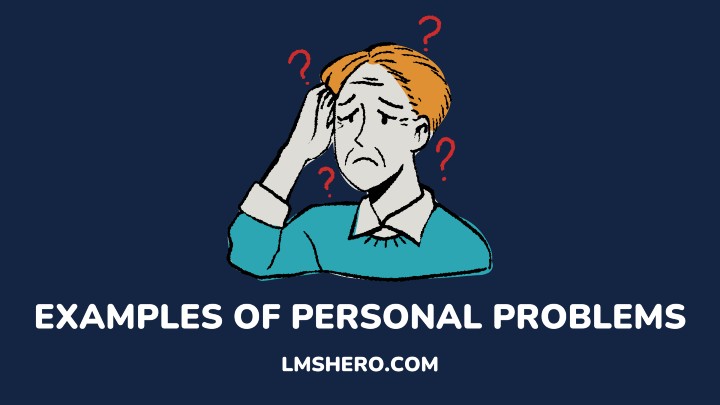Everyone at certain stages in life has witnessed examples of personal problems and their negative effects. Being unable to effectively handle this situation can lead to poor performance both at the office and school.
Are you going through some personal issues in your life and need pointers on how to handle them?
Here you will find examples of personal problems, the effects of personal problems, and how you can solve these issues.
What are personal problems?
An issue that affects your life outside of your job or education, such as your health, finances, or family, is referred to as a “personal problem.”

Anything going on in your life that can also interfere with your ability to concentrate and do your job properly is a personal problem.
Personal problems are any issues that an individual has. This may also affect your opinion, values, or things that have more to do with yourself than with other people.
What are examples of personal problems?
Examples of personal problems include relationship failures, poor health, addictions, legal troubles, job loss, or workplace toxicity. Personal issues can also include;
- Family crises
- Inner conflict based on your religious views
- Sex-related issues
- Financial incapability
- Obsessive behavior
How can personal problems affect work?
If ignored or managed improperly, personal issues can have a negative impact on how well you perform at work.
Performance is negatively impacted by personal and work-related issues since they lead you to make repeated mistakes, affect relationships with your coworkers, and make your productivity decline.
These issues may not only interfere with your ability to do your job effectively, but they may also lead to the following:
- Tardiness
- Absenteeism
- A lack of tolerance for their coworkers, violence
- Diversion
- Insubordination
How do you separate personal problems from work?
Having clear boundaries between your personal and professional lives helps you be more productive at work. It also helps you experience less stress overall. More relaxation and less burnout result from setting these boundaries.
The impact of a personal problem on your ability to accomplish your job depends on how you handle it. The following are some methods to prevent personal matters from interfering with your work:
- Request help
- Understand the situation and make moves to solve it
- Limit the information you share
- Set realistic goals
- Be respectful no matter what you’re facing
- Understand your legal rights
- Learn healthy relaxation techniques
- Adjust work plans as needed
- Inform your colleagues and supervisor
How to handle personal problems
Everybody has issues; even the richest person on earth faces difficulties in life. There are moments when these issues seem insurmountable and as though you might not be able to overcome them.
You can handle any issues that come your way, though, if you accept responsibility for your issues. Try making a plan to address these issues constructively.
Setting a solution approach that includes the following can be useful.
- Take action: Taking action as soon as you can is the greatest way to address your issue.
- Find the right balance: Your physical and mental health may suffer as a result of problem-solving. Allowing yourself to rest and concentrate on other things will help.
- Avoid being negative: Keep in mind that negativity can make it more difficult for you to solve a problem. Reinterpret the issue and negativity into something constructive to help you deal with the circumstance more skillfully.
- Support your actions and goals mentally: While tackling issues, keep up a positive mindset. This will enable you to face your goals and challenges-handling initiatives more successfully.
- Keep moving forward: Problems can occasionally take a bit longer to fix than you expected. Continue working toward your goals and solutions with a winning mindset. This will hopefully enable you to approach the issue in a positive way.
- Embrace positive changes. You’ve probably started making progress in your life if you’ve acknowledged your issues and created goals to address them. Accept these adjustments and the ways they will aid you in solving your issues.
- Setbacks may occur: It’s inevitable to have some setbacks when actively attempting to solve difficulties. Recognize the setback, address it as necessary, and then keep pushing forward to solve your difficulties.
FAQs
How do personal problems affect students?
Personal issues can affect a student’s ability to put effort into a course or their overall academic success.
These problems may include substance abuse, issues with one’s mental or physical health, and other personal issues
Do problems go away on their own?
No, issues don’t resolve themselves unless they are dealt with or resolved.
Finding the source of a challenging problem and creating workable solutions requires learning problem-solving skills.
How do you develop problem-solving skills?
You must specify the desired outcome in order to solve difficulties.
This phase is essential for successfully learning problem-solving techniques. You will be more successful in tackling a problem if your mind is ready to meet it.
Conclusion
Personal problems can take a toll on the life of an individual. From a reduction in performance at work to strained relationships and a lack of tolerance for others.
If you’re currently the one facing these personal problems, learning how to separate your personal problems from work and effective problem-solving skills are important.
Learn all you can about problem-solving skills and how to effectively reach a solution to any problem you might face.
I hope you found this article helpful. Thanks for reading.







